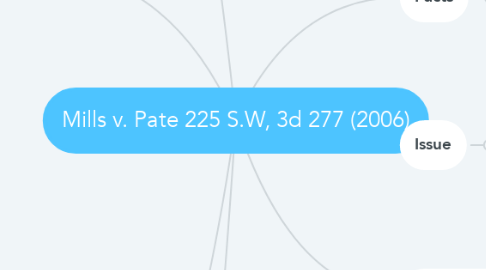Mills v. Pate 225 S.W, 3d 277 (2006)
by Sheree Johnson

1. Rule of Law
1.1. Under former TEX.REV.CIV.STAT. art. 4590i, section 6.02, for health care liability claims based on the failure of the physician to disclose or adequately to disclose the risks and hazards involved in the medical care or surgical procedure rendered by the physician, recovery may be obtained only under the theory of “negligence in failing to disclose the risks or hazards that could have influenced a reasonable person in making a decision to give or withhold consent.”
1.2. Hartfiel v. Owen, 618 S.W.2d 902, 905 (Tex.Civ.App.-El Paso 1981, writ ref’d n.r.e.)(a plaintiff may not recover for negligence under theory of informed consent unless he proves both that he would not have consented to treatment had he been informed of the undisclosed *289 risk and that he was injured by the occurrence of the risk of which he was not informed).
1.3. A cause of action against a health care provider is a health care liability claim under the Act if it is based on a claimed departure from an accepted standard of medical care, health care, or safety of the patient, whether the action sounds in contract or tort
2. Analysis
2.1. Ms. Mills alleged that Dr. Pate had failed to adequately disclose information to her as to the second liposuction and if he had disclosed the risks and hazards inherent in the procedure
2.2. Dr. Pate representations about the quality or characteristics of the services he sold to Ms. Mills were, related to their patient-client relationship, these representations are not inseparable from her negligence claims against him and consequently, they do not require a determination as to whether Dr. Pate failed to meet the accepted standard of medical care for cosmetic surgery.
2.3. Ms. Mills amended her original petition to include a breach of express warranty claim. In her claim, she alleged that Dr. Pate made the following representations to her about the quality or characteristics of his services: (1) she was a suitable candidate for surgery; and (2) after liposuction surgery, she would look beautiful and that she would have smooth skin without ripples, bulges, or bags
3. Courts Reasoning
3.1. Trial court correctly found there was no evidence that Dr. Pate failed to obtain Ms. Mills’ informed consent to the second surgery.
3.2. Ms. Mills’ breach of warranty claim is not an improper attempt to recast her informed consent claim to avoid requirements of the Act. Rather, there is some evidence that Dr. Pate’s particular representations were actionable as an express warranty claim in that his representations did not conform to the character and quality of the services promised, they formed the basis of the parties’ bargain for the first surgery, and injury resulted to Ms. Mills. claim of a breach of warranty claim
3.3. The court applied the facts in the case to the legal requirements. The Sorokolit Court concluded that the plaintiff’s express warranty claim was not precluded under the Act where a physician guaranteed a particular result and the claim did not require “a determination of whether a physician failed to meet the standard of medical care.
3.4. Relying on Sorokolit, Ms. Mills contends that where a physician promises particular surgical results, he may be held liable for breach of that express warranty. In Sorokolit, the physician guaranteed that following breast surgery, the plaintiff’s breast would look just like the breasts in a photograph she selected prior to surgery. The Sorokolit Court concluded that the plaintiff’s express warranty claim was not precluded under the Act where a physician guaranteed a particular result and the claim did not require “a determination of whether a physician failed to meet the standard of medical care
3.5. Yes, Dr. Pate’s remarks, the promised results, and injuries she suffered raises genuine issues of material fact as to each challenged element of Ms. Mills’ breach of express warranty claim with respect to the first surgery, for which she paid Dr. Pate to perform
4. Conclusion
4.1. The appeals court affirmed the trial court’s judgment in part, reverse in part, and remand the cause to the trial court for further proceedings.
5. Facts
5.1. Ms. Mills filed a medical malpractice suit against Dr. Pate who performed liposuction and thigh lift on patient, alleging claims for negligence, lack of informed consent, and breach of express warranty.
6. Issue
6.1. Did Dr. Pate perform acts of negligence, lack of informed consent, and breach of express warranty?
7. Impact/Importance and Influence
7.1. A health care professional would care about the decision because they would want to articulate reasonable expectations of their services to their patients.
7.2. Informed consent and determining expectations of surgery are two business practices influenced by this case
7.3. Other cases that site this care are; Gomez v. Pasadena Health Care Management Inc.; MacFarlane v. Burke


